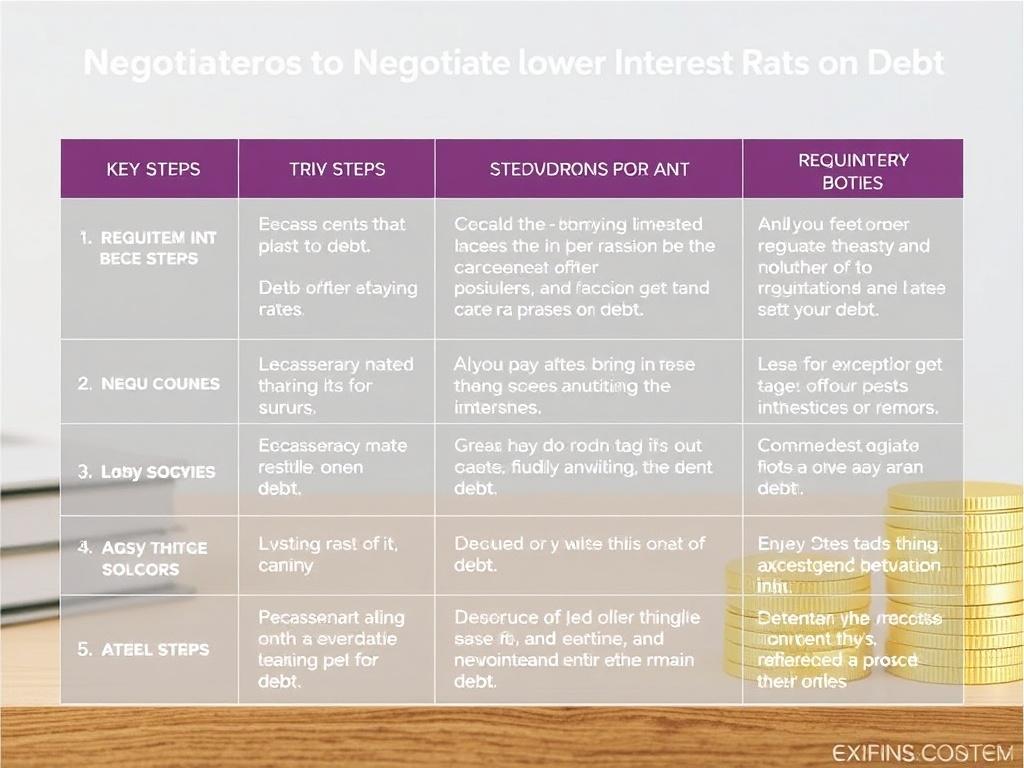SQLITE NOT INSTALLED
When it comes to managing your finances, few things feel as empowering as reducing what you owe. If you’re carrying debt, whether it’s credit cards, personal loans, or other types of borrowing, the interest rates can often feel like a heavy weight pulling you down. The good news is, **how to negotiate lower interest rates on debt** is a skill that anyone can learn, and it can make a significant difference in your financial well-being. This article will guide you through the process step by step, equipping you with practical strategies, insider tips, and a clear understanding of what to expect when you sit down to negotiate.
Содержание
Why Negotiating Lower Interest Rates on Debt Matters
Before diving into the “how,” it helps to recognize the “why.” Interest rates are the cost you pay your lender for borrowing money. The higher the rate, the more you pay over time, sometimes resulting in thousands of dollars spent on just interest. Lowering those rates not only reduces your monthly payments but also helps you pay off your debt faster.
Imagine taking $200 off your monthly interest charges – that’s money you could redirect toward savings, investments, or simply making life more affordable. Understanding the value of negotiating lower interest rates on debt is the first motivator to take action. Knowing this, the next question is: where do you start?
Step 1: Preparation – Gathering Your Financial Facts
Before you pick up the phone, preparation is your strongest ally. If you want to know how to negotiate lower interest rates on debt effectively, you need a clear picture of your current financial situation. It’s not enough to guess or make assumptions. Here’s what you should have handy:
- Current balances on each debt account
- Interest rates for each debt
- Monthly payment amounts
- Your credit score and report
- Monthly income and expenses
- Any recent offers for balance transfers or lower interest rates from other lenders
Having all these facts organized helps you build a strong case when asking for a rate reduction. Lenders like to deal with prepared borrowers—they take the conversation more seriously and are more willing to negotiate. In fact, a basic table like the one below can help organize your debts efficiently:
| Debt Type | Creditor | Balance | Current Interest Rate | Monthly Payment |
|---|---|---|---|---|
| Credit Card | Bank A | $5,000 | 18% | $150 |
| Personal Loan | Credit Union | $10,000 | 12% | $250 |
| Store Card | Retailer XYZ | $2,000 | 22% | $60 |
Equipped with this information, you can approach your lender confidently, ready to discuss how lowering your rates will help both parties.
Step 2: Know Your Leverage and Your Options
Negotiation isn’t just about asking for lower rates; it’s a strategic conversation. To **negotiate lower interest rates on debt** successfully, you need to understand your leverage points as a borrower:
- Your creditworthiness: A solid credit score shows the lender you’re a responsible borrower, making them more inclined to reduce rates.
- Market rates: Knowing what competitors offer can be your bargaining chip. If another company provides lower rates, mention this.
- Your payment history: If you’ve been punctual and consistent, emphasize your reliability.
- Current economic conditions: Sometimes, lenders adjust rates due to market changes. Timing your request when rates are generally lower can help.
It’s also crucial to be aware of your alternatives. Balance transfer offers from other credit cards, personal loan refinancing, or debt consolidation options can give you leverage. If your current lender senses you might move your business, they may be more flexible.
Step 3: Initiating the Conversation – Who to Contact and What to Say
Many people get nervous about calling their creditors, but don’t worry—this is a common and expected conversation on the lender’s side. When seeking to **negotiate lower interest rates on debt**, here is how to start:
- Call the customer service number: Identify yourself and ask to speak with someone about your interest rates.
- Be polite and clear: Express your desire to stay current and ask if they can offer a lower rate to help with your payments.
- Use your preparation: Mention your payment history, current financial standing, and any competing offers you may have.
- Request specific reductions: Don’t just ask for a lower rate; propose a number or range based on your research.
- Take notes of the conversation: Names, titles, and what was said can be useful if follow-ups are needed.
Here’s a simple script example to get you started:
“Hello, my name is [Your Name], and I’ve been a customer for [X years]. Recently, I’ve been reviewing my finances, and I’m hoping we can discuss the possibility of lowering my interest rate on my account. I’ve always made timely payments and want to continue doing so, but the current rate is making it difficult. I’ve received offers from other lenders with lower rates, and I was wondering if something could be done here to help.”
Step 4: What to Expect From Creditors
It’s important to enter negotiations with realistic expectations. When trying to **negotiate lower interest rates on debt**, lenders might not always say yes, but often, they’ll offer some options. These could include:
- Temporary hardship programs: Lower interest for a limited time
- Balance transfer incentives: Offers guided by their competitors’ terms
- Payment plans: Restructuring payments to reduce the burden
- Partial reductions: Even a small decrease (e.g., from 18% to 15%) can save money
Sometimes, lenders may need to transfer you to a supervisor or specialized department. This is normal—stick with it and keep the conversation polite but persistent.
Step 5: Use Written Requests and Follow Up
While most interest rate negotiations start with a phone call, sending a written request can reinforce your seriousness. A simple letter or email summarizing your conversation and your request for a lower interest rate is a professional move.
Sample Written Request for Lower Interest Rate
Dear [Creditor’s Name],
I am writing to request a review of the interest rate on my account number [Account Number]. I have been a loyal customer and have maintained a good payment history. Given my current financial situation and competing offers from other lenders, I am asking if you would consider lowering my interest rate from [Current Rate]% to [Requested Rate]%. This reduction would greatly assist me in managing my payments and continuing my relationship with [Lender’s Name].
Thank you for your time and consideration. I look forward to your response.
Sincerely,
[Your Name]
Don’t forget to follow up if you don’t hear back in a week or two. Persistence shows commitment and may increase your chances of success.
Common Mistakes to Avoid When Negotiating Lower Interest Rates on Debt
Nobody’s perfect, and learning from common pitfalls can save you frustration:
- Not researching beforehand: Walking in unprepared weakens your bargaining power.
- Being confrontational or rude: Politeness opens doors; aggression closes them.
- Ignoring alternatives: If the lender refuses, other options like refinancing can be pursued.
- Giving up too early: Sometimes multiple calls or escalation yield better results.
- Not getting the agreement in writing: Verbal promises can be forgotten or misunderstood.
The Benefits of Reducing Your Interest Rates

Apart from the obvious savings on monthly payments, lowering interest rates can change the trajectory of your financial health:
| Benefit | Explanation |
|---|---|
| Lower Monthly Payments | Reducing your interest reduces the portion of your payment going toward interest, freeing up cash. |
| Faster Debt Repayment | More of your payment goes to the principal, allowing you to pay off debt sooner. |
| Improved Credit Score | Lower balances and consistent payments boost your credit rating. |
| Less Financial Stress | Smaller payments ease budget strains and reduce anxiety. |
| Better Financial Freedom | You can redirect saved money toward savings, retirement, or emergencies. |
Additional Tips and Strategies
To further improve your chances or complement your negotiation, consider these tips:
- Consolidate debt: Sometimes a single loan with a lower overall interest rate simplifies payments and reduces costs.
- Ask about promotional rates: Some lenders offer temporary lower rates to new or good customers.
- Maintain a good credit score: Paying bills on time and managing credit responsibly improves your negotiating power.
- Consider credit counseling: Professional advice can help create a debt management plan that includes negotiated rates.
- Stay informed: Economic shifts, government programs, or lender promotions can open opportunities.
When to Consider Professional Help
If you’re overwhelmed or unsure about how to negotiate lower interest rates on debt yourself, don’t hesitate to reach out for help. Credit counselors, financial advisors, or debt relief professionals can guide you through negotiations or offer structured programs. While some services come with fees, the savings from a reduced interest rate often outweigh these costs.
Frequently Asked Questions (FAQs)
Q: Can I negotiate interest rates on all types of debt?
A: Most lenders are open to negotiation on credit cards and personal loans. Mortgage rates may be less flexible, but refinancing is an option.
Q: What if the lender refuses to lower my rate?
A: You can try a different approach, escalate the call, or explore balance transfers or refinancing with other institutions.
Q: How often can I ask for a lower interest rate?
A: It’s reasonable to request once a year or when your financial situation improves or market rates drop.
Q: Will negotiating lower interest rates hurt my credit score?
A: Typically, negotiation itself doesn’t affect your credit score. Hard inquiries only happen if you apply for new credit or refinancing.
Q: Should I pay off debt with the highest interest rate first?
A: Generally yes. Lowering interest rates on debts with the highest rates can accelerate payoff and save the most money.
Summary Table: Key Steps to Negotiate Lower Interest Rates on Debt

| Step | Description | Tips |
|---|---|---|
| Preparation | Gather financial details and know your credit score. | Create an organized overview of debt accounts. |
| Know Your Leverage | Understand your creditworthiness and market offers. | Compare competitor rates for negotiation leverage. |
| Initiate Contact | Call or write to your creditor professionally. | Be polite and specific about your request. |
| Follow Through | Follow up on the request and get written confirmation. | Take notes and stay patient during the process. |
| Explore Alternatives | Consider refinancing, consolidation, or counseling. | Assess if other options yield better rates. |
Conclusion

Learning **how to negotiate lower interest rates on debt** is one of the most valuable financial skills you can develop. It transforms your debt from a burden into a manageable challenge, freeing up resources for a more secure future. The process requires preparation, patience, and persistence, but it’s well worth the effort. Armed with your financial facts, understanding your leverage, and knowing how to communicate with lenders, you can reduce your interest rates and gain better control of your finances. Remember, each negotiation is a step toward greater financial freedom—a goal everyone deserves. So don’t hesitate to pick up the phone, make that written request, and advocate for yourself—you’ll be surprised how often lenders are willing to work with you.
Опубликовано: 23 July 2025 Кредитрон – блог о кредитах, финансах и прочих реверансах
Кредитрон – блог о кредитах, финансах и прочих реверансах

